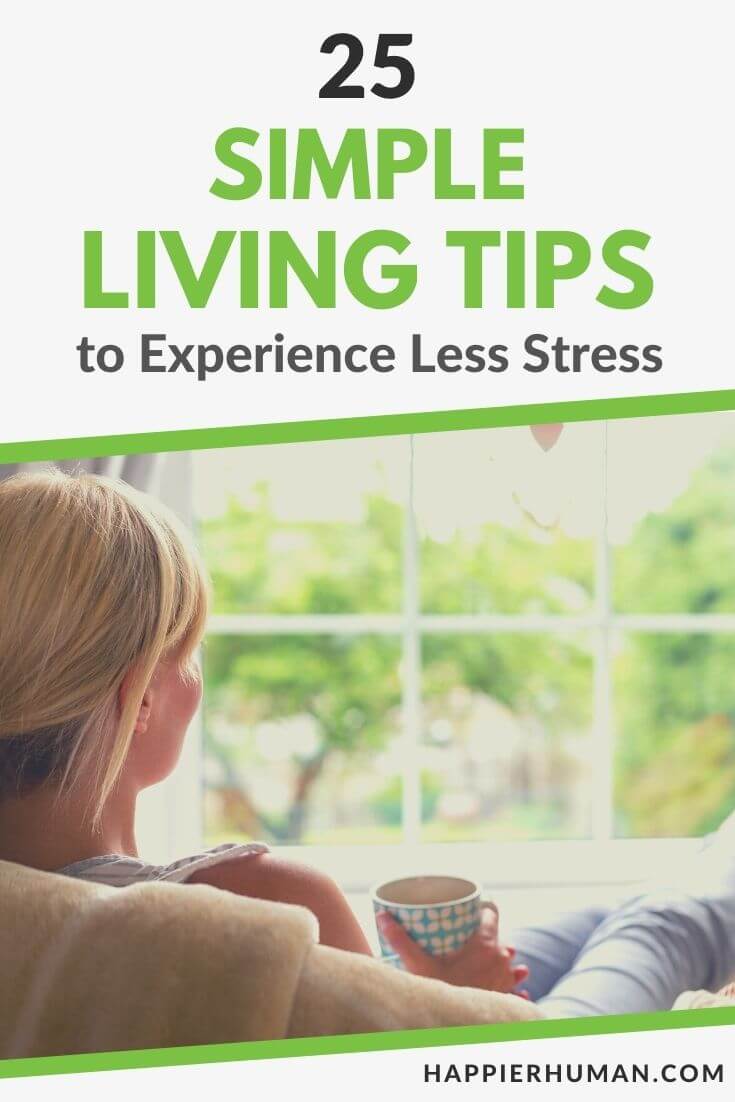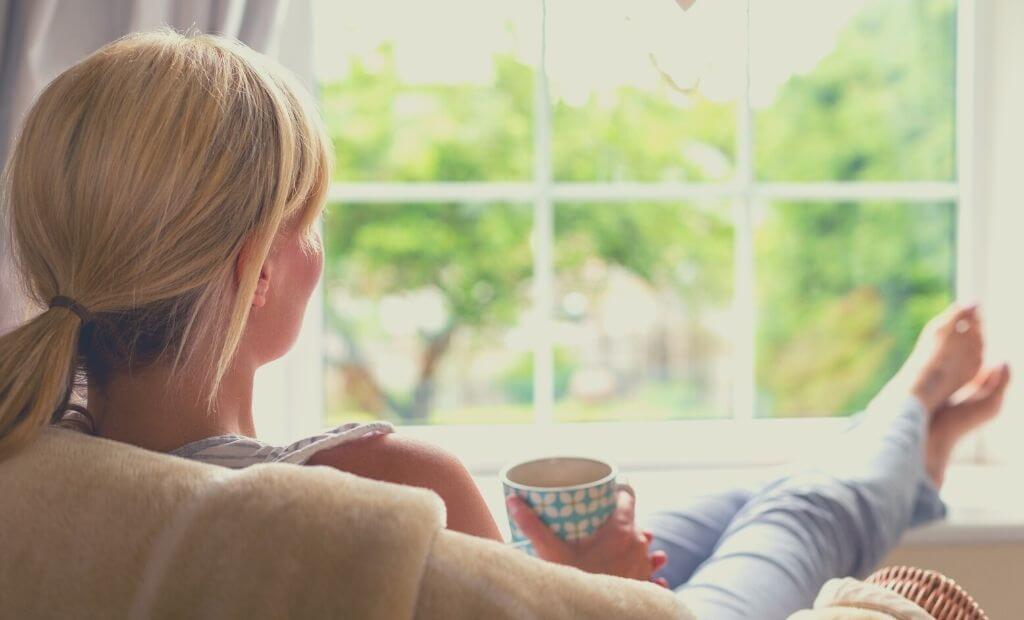Like so many of you, I battled stress throughout much of my life… until the day came when I finally accepted something: no matter how you twist or turn it, stress is an integral part of our existence. It's never going go away. What matters is how you manage it to reduce the effects on your health and overall quality of life. Even little changes in routine and thought patterns can make a huge difference.
One of my personal stress-management strategies for living simple comes from the Serenity Prayer. Part of it says, “God, grant me the serenity to accept the things I cannot change.” I have to admit this absolutely changed the way I deal with life stressors. I couldn't provide you with 25 simple living tips for a happier life without including “acceptance.”
What Is Simple Living?
“Basic” and “without much” are some of the descriptions used to explain what simple living means. It's the opposite of elaborate or complicated living. The lifestyle is also distinct from minimalism, where the focus is on reducing your possessions in order to live simply.
Living with simplicity can include acquiring only the basic things needed for sustenance or preferring a traditional over a modern lifestyle. It could be a decision to only engage with people and in social activities that promote well-being and happiness.
Why Do People Prefer to Live Simply?
Exploring and understanding the “why” of every life decision you make allows you to decide if it's what you truly desire. Many people, including myself, choose an easy-going life because it limits stress and its effects on the body.
For example, buying a big house in a fancy neighborhood often means getting a mortgage and years paying back the loan. That's at least 10-15 years of stress and more grey hairs worrying about keeping a roof over your head.
Benefits of Simple Living
Simple living empowers you to live on your own terms instead of being held hostage by the demands of things that aren't needed to sustain life. Stripping away all the “noise” gives you more time to focus on self-care and the things that make you happy. Other benefits include:
25 Simple Living Tips to Experience Less Stress
At Happier Human, we're all about giving you practical tips to live life better. That’s why we've decided to save you the stress of combing through the internet for simple living tips by providing you with 25 easy ways to enjoy a calmer life.
1. Establish routines.
Setting up routines keeps life organized and easier to manage. Divide your day into things you'll do in the morning, mid-afternoon, and evening. Routines add structure to your day. You can clearly see your daily tasks and set your mind on completing them.
Being organized allows you to do more in less time. You're left with extra hours to focus on fulfilling activities like quality time with your family.
2. Simplify your schedule.
Do you often feel like superman, trying to get everything done in a day? A hectic schedule is a source of stress. You'll feel nervous or anxious if the day is coming to an end and you're only 1/3 way through your to-do list.
Have you considered that maybe it's because there isn't enough time to complete your tasks? Cut stress by limiting your daily commitments only to essential matters and give yourself some breathing space between each task.
3. Do something daily that enhances your life.
Have you ever found yourself doing so much in a day, yet felt like you accomplished nothing? An unmistakable chronic feeling of dissatisfaction lingers. The reason you feel that way has to do with omitting to do something that adds value to your day.

Maybe it was taking a 30-minute mental health break to unwind and rebalance. You realized you spent that spare time scrolling through social media and left feeling more stressed.
4. Let go of unhealthy coping habits.
Unhealthy habits may seem to provide relief for a moment but add more stress to your day. I'm referring to habits such as frequent alcohol drinking, smoking, or binge eating.
It's not uncommon for people to engage in unhealthy or addictive behaviors to cope, without realizing the negative physical and mental health effects. Try cultivating positive coping habits such as doing yoga, meditation, or journaling to relieve stress and anxiety.
5. Stay active.
The COVID-19 pandemic led to many employees working from home. It felt good at first, I ain't gonna lie. In the long run, being holed up in one static place becomes frustrating. You long to see and interact with the outside world.
A sedentary lifestyle may also lead to health problems such as body aches or chronic back pain. Go outdoors daily for a walk, run, or exercise. Physical activity decreases cortisol and adrenaline (stress hormones) and boosts energy and mood.
6. Limit social media.
The psychological stress linked to social media is now widely accepted as a fact and not fiction. While a digital world has its benefits, many of us have trouble managing how much and what type of information we consume. That's because everything, good and bad, is right there in your face, all day long.
Social media might distract you from getting your work done and result in anxiety while hustling to meet deadlines. Be selective of what news or show you ingest, taking care to eliminate content that affects your emotional well-being.
7. Avoid financial debt.
I started putting all those credit card invitation mails in the trash, unopened! Credit is money you don't own. As a rule of thumb, if I can't afford to buy with cash, I probably couldn't afford the item in the first place.
There will be fewer bills and less stress when you stop spending money that doesn't belong to you. Ban credit cards. Cut them up and toss them out. Experience the mental freedom that comes from being debt-free.
8. Become a minimalist.
The day I realized that I had way too much household “stuff” I didn't need, I instantly decided to switch to a minimalistic lifestyle. What was the point of buying things I never used or letting them occupy space?
You get a certain overwhelming feeling walking into a house filled with too many unnecessary things and it triggers a need to escape. I felt exceptionally relieved and at peace after downsizing my home and donating unwanted possessions to charity.
9. Stop paying for services you don't use.
There's always an ad online or on TV tempting you to subscribe here, there, and everywhere. The ads are so crafty they make you feel you're missing out, so you sign up. Months or years pass before you realize you're losing money on TV subscriptions or gym memberships you hardly ever use.
Click the “unsubscribe” button and enjoy greater financial freedom by redirecting your money to things you'll benefit from.
10. Declutter your ‘space'.
Clutter is any unnecessary thing that makes your space look disordered or untidy. You'll know it's time to toss out your possessions (declutter) if they no longer add value or stop bringing you joy.
I know it can be hard to detach from certain items. However, decluttering creates more physical space and gives a sense of relief. Clearing space also applies to getting rid of toxic thoughts and beliefs that lead to stress and anxiety.
11. Organize your home.
Rummaging through three pocketbooks and five drawers searching for your car key, phone, or wallet. Sounds familiar? You begin to panic. A few more minutes of searching will make you miss your train to work. Dang!
Simplify your life by organizing and having a designated place for everything. You'll feel at ease knowing you can quickly locate your belongings and get there on time.
12. Clear your desk.
Seriously, do you really need 10 pens, 6 highlighters, and piles of personal bills on your desk? An unorganized or cluttered desk causes confusion and nervousness when you're unable to locate an item.

A cluttered workspace also contributes to loss of time and a drop in productivity. Take a few minutes to free your space and mind by removing nonessential items and discarding things that have no use.
13. Check emails less frequently.
Instant mail is both a blessing and a curse. If not managed properly, you'll find yourself checking your email every chance you get. Not to mention how much of a distraction it creates.
Allocate a time to check and respond to emails once a day, unless your job requires you to stay connected throughout the day. Use the time you saved to do something therapeutic such as drawing or coloring.
14. Minimize multitasking.
Multitasking is a great way to do many things but hardly gets anything done. Studies show doing several tasks at once reduces focus, efficiency, and productivity. You'll likely end up having multiple unfinished tasks or finished assignments fraught with errors.
Try focusing on one thing at a time in order of priority. See it to the end (if possible) before switching to something else.
15. Switch off notifications.
Millions of people are almost inseparable from their electronic communication devices. Some sleep with their phones under their pillows at night. They anxiously wait for the next email, text message, or DM.
Is every ping causing you to react? There's heightened curiosity to check each and every notification. This leaves you anxious, drained, or sleep-deprived. Disabling notifications, especially at night, lets you take back control of when you engage.
16. Take a mental health break.
Good mental health is vital for daily functioning, but many of us don't nourish our psychological and emotional well-being enough. You're either too busy or too tired to time out, collect your thoughts, and decompress. You end up going to bed stressed and unable to get a good night's rest. Frequent mental breaks calm your nerves, help you sleep better, and enhance well-being.
17. Set aside time to do nothing.
Huh? Do nothing? If you're wired to keep on going like the energizer bunny then the thought of “doing nothing” might make you anxious. Some people derive their sense of worth from always having something to do. Down tools and step away from it all to be with your SELF. Do absolutely nothing. Stay still. Focus on your breathing. Listen to your heart beating. Feel the calm.
18. Say “No”.
People-pleasing wears you down and can lead to caregiver burnout. I get it. You're a nice person who wants to see everyone happy. The thing with always saying, “Yes,” is it results in ignoring your own needs. By saying “No,” you're setting a boundary. It lets people know that your kindness has a time and a place. You'll feel more in control and have time to handle your own priorities.
19. Stop ruminating.
Ruminate means repeatedly or obsessively going over a past event in your mind. First of all, holding on to the past takes up a lot of mental space. What's more, ruminating raises stress levels and is a risk factor for the onset of major depression and anxiety.
Distracting yourself with something more pleasing like painting or crafting can help to reduce your tendency to obsess over the past. Another technique is to process the event, feel your feelings and let go.
20. Slow down.
You're hurrying there, rushing everywhere, worried and anxious that you won't get there on time or finish your tasks. Blood pressure, heart rate, adrenaline, and cortisol rise when you overexert yourself.
Rushing also increases the chance of errors. Pace yourself and take the time to appreciate the beauty in everything. You'll feel calm, relaxed, and more at peace.
21. Define what success means for you..
“Success” takes on a different meaning for everyone, depending on who’s talking about it. For me, it means enjoying healthy and loving relationships. Others measure success through wealth, academic achievement, titles or material possessions.
Defining what success means to you allows you to pursue the things you believe will make you feel accomplished. You’re less likely to think of yourself as a failure when your achievements do not match up to other people’s ideas of success.
22. Live in the present.
Yesterday is gone and tomorrow is uncertain. I live by that motto. Living in the here and now is a principle of mindfulness, a popular technique for stress reduction.

Focus on one thing at a time. Hear your thoughts and feel your feelings, but avoid labeling or judging them. Mindfulness also teaches you to focus on your breathing as a way to distract you from ruminating. Appreciate the now, forgive, and let go.
23. Create a vision board.
A vision board (or goal board) is a collage of words, quotes, affirmation and pictures that lets you clearly visualize things you want to achieve. Having clarity can make living a lot less of a hassle, boost your mood and inspire hope.
You should feel motivated to act on your goals and dreams every time you look at the board. Feel free to include stress-management prompts such as “mindfulness,” breathing exercises, or photos of serenity, freedom and happiness.
24. Repeat positive affirmations.
Negative thoughts about yourself, people, and life as a whole can lead to anger and frustration. Positive affirmations are phrases or statements you repeat daily to challenge negative thoughts and beliefs. As you create a healthier mindset, you'll overreact less, feel more confident, and increase your chance of success.
25. Accept the things you cannot change.
As human beings, we tend to have a strong desire to manipulate the process and control the outcome. We're left feeling sad, disappointed, or brokenhearted when things turn out differently than expected. Through acceptance, you can let go of your attachment to the outcome. Acceptance also enables you to cope better when things go wrong.
“Life is really simple but we insist on making it complicated.” ~Confucius~
Final Thoughts on Simple Living Tips to Experience Less Stress
Simple living means taking the time to “stop and smell the roses” and prioritize what matters most in your world. Once you master this, you’ll transform your life from one that feels rushed or mundane… into one that is happier, healthier, more fulfilling and more balanced.
The tips outlined here are designed to help you on your journey to finding and embracing the simple life. And when you get there, your life will take on a new meaning, as you'll have more time to do the things that nourish your soul, body and mind. Got some extra time? Check out the 9 Best Minimalist Books to Live a Simplified Life.
Finally, if you want a simple way to reduce your stress and anxiety, then try writing these 35 mindfulness journaling prompts to live more in the present moment.


